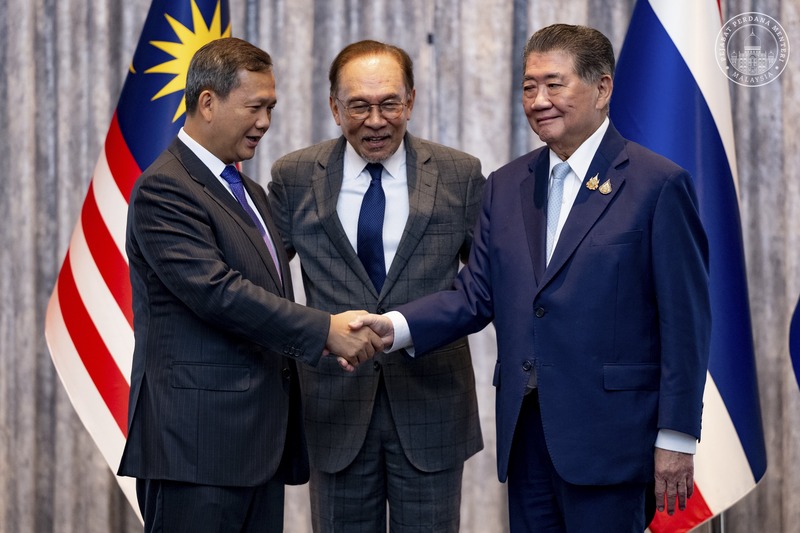Already a subscriber? Make sure to log into your account before viewing this content. You can access your account by hitting the “login” button on the top right corner. Still unable to see the content after signing in? Make sure your card on file is up-to-date.
Thailand and Cambodia have agreed to an immediate and unconditional ceasefire after nearly a week of deadly border clashes that have left dozens dead and displaced over 200,000 people.
Alhamdulillah, dua negara sahabat ASEAN, Thailand dan Kemboja bersetuju menamatkan persengketaan melalui gencatan senjata mulai tengah malam ini.
— Anwar Ibrahim (@anwaribrahim) July 28, 2025
Inilah bukti nyata kekuatan diplomasi ASEAN yang berpaksikan muafakat, rundingan dan prinsip kemanusiaan. Malaysia bukan sekadar… pic.twitter.com/iKiFdCLq4J
Some shit you should know before you read: Five days ago, fighting broke out between Thailand and Cambodia along their disputed border, triggering one of the deadliest flare-ups in years. The conflict centers on long-contested territory near ancient temples, with both sides accusing the other of initiating attacks. Thailand claims the violence began when Cambodian forces deployed surveillance drones and fired into Thai territory, while Cambodia alleges that Thai troops violated prior agreements by advancing near the Preah Vihear temple complex. Each nation has traded blame for attacks on civilian areas. So far, at least 35 people have been killed (22 in Thailand and 13 in Cambodia) and over 200,000 civilians have been displaced as heavy shelling and airstrikes continue.
What’s going on now: During a round of peace talks in Kuala Lumpur, Thailand and Cambodia agreed to an immediate and unconditional ceasefire along their disputed border. The agreement was brokered by Malaysian Prime Minister Anwar Ibrahim, who hosted both Cambodian Prime Minister Hun Manet and Thailand’s acting Prime Minister Phumtham Wechayachai at his official residence. As current chair of the Association of Southeast Asian Nations (ASEAN), Anwar described the ceasefire as “a vital first step to a de-escalation and a restoration of peace and security.” The deal includes a commitment from both sides to cease hostilities starting at midnight local time, withdraw troops from forward positions, re-establish direct communication between military and political leadership, and allow independent monitoring of the ceasefire’s implementation.
Thailand’s acting Prime Minister Phumtham Wechayachai stated that the agreement “reflects Thailand’s desire for a peaceful resolution, while continuing to protect our sovereignty and the lives of our people.” Cambodian Prime Minister Hun Manet, for his part, called it a “very good meeting” and expressed hope that it would end the violence immediately. Although both sides committed to the ceasefire, intermittent gunfire and artillery strikes were still reported as late as Monday evening.
President Donald Trump played a central role in forcing both parties to the table. Over the weekend, Trump warned that tariff negotiations with the US would be frozen if the fighting didn’t stop. After the ceasefire was announced, he wrote on Truth Social: “Just spoke to the Acting Prime Minister of Thailand and Prime Minister of Cambodia. I am pleased to announce that, after the involvement of President Donald J. Trump, both Countries have reached a CEASEFIRE and PEACE. Congratulations to all!” He added: “I have instructed my Trade Team to restart negotiations on Trade. I have now ended many Wars in just six months — I am proud to be the President of PEACE!”
US Secretary of State Marco Rubio also backed the agreement, writing on X: “The United States applauds the ceasefire declaration between Cambodia and Thailand announced today in Kuala Lumpur. @POTUS and I remain committed to ending this conflict.” Rubio confirmed that US State Department officials had been present in Malaysia to assist with the negotiations.
China, another key trade partner to both nations, also quietly supported the talks, with both sides acknowledging Beijing’s role. Malaysia, in turn, offered to provide observers to monitor the ceasefire’s implementation.







